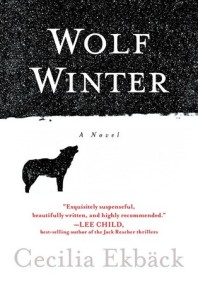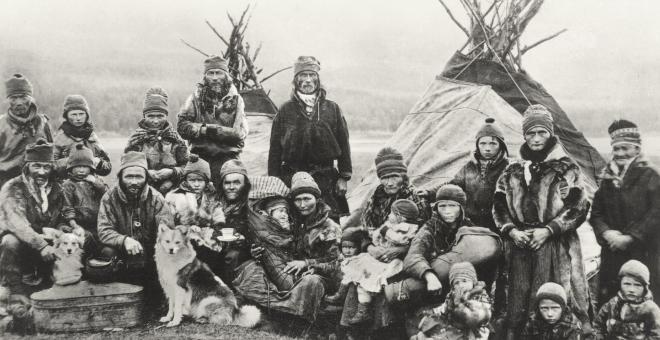 Set in Swedish Lappland in 1717, Cecilia Ekbäck’s debut novel Wolf Winter follows a family of four, Maija, her husband Paavo and their daughters Frederika and Dorotea from a fishing village in their native Finland to the forested lands surrounding Sweden’s Blackåsen mountain.
Set in Swedish Lappland in 1717, Cecilia Ekbäck’s debut novel Wolf Winter follows a family of four, Maija, her husband Paavo and their daughters Frederika and Dorotea from a fishing village in their native Finland to the forested lands surrounding Sweden’s Blackåsen mountain.
They swap houses with Maija’s brother, deciding a life in the interior may be better suited to Paavo, who had developed numerous fears keeping him from earning his living at sea. However, when their daughters stumble across a dead body allegedly killed by wolves, on a route near the mountain, they begin to wonder whether they have left one dark dream for an even blacker nightmare.
Maiji suspects it was a crime and makes it her business to ask questions to an extremely reticent and unappreciative band of local settlers and itinerant Lapps. Her husband never questions her interference, even when present he plays no role and as soon as the first signs herald the approach of winter, he sets off alone for the coast, leaving the women-folk to survive the harsh physical elements and the even stranger mystical apparitions that some but not all will witness. Without a man to steer them out of trouble, the woman face many risks, not least being perceived as dabbling in witchcraft, as church records show has happened to a few others with similar inclinations who preceded them.
There is a new priest in town whom Maiji spends a few evenings shovelling snow with, holed up in her cabin, and the widow of the previous priest, who seems to know more than she is willing to pass on, brothers who steal wives, wolves whom some see and not others, and a teacher whose presence seems to awaken the angry ghosts of the departed.
Unfortunately, I couldn’t really get into this novel in the way I wanted to, though it wasn’t a difficult read. It didn’t portray a sense of the era, it felt contemporary even though it did evoke a strong sense of place and it was clear there were no modern comforts. Perhaps it was the attitude and freedom of the protagonist that didn’t sit with the era.
The time spent with a number of the characters was so fleeting, it left too little of an impact and rendered them insufficient to develop an interest in. The storyline itself raised so many questions that went unanswered, like why did the husband go off and leave his family in such a vulnerable position when they could have gone with him and been protected. And why did the wife think she as a newcomer could become an investigator into a crime that clearly the locals were not happy about being questioned, especially when it threatened her safety. Her role was to assist in bringing new life (she was a kind of midwife) and yet at every turn she was endangering those close to her. The younger daughter nearly lost her feet to frostbite after trekking in a blizzard to ask the Lapps questions about the murder. I didn’t believe in Maiji’s intentions and relationships and the blurred line between reality and the mystical elements. I wanted to be drawn in by it, but was unable to brush off the scepticism.
So what drew me towards reading this novel in the first place?
Well the snowy winter setting was very appealing, the plot sounded intriguing and the praise of Hilary Mantel and the Library Journal, who had this to say definitely lured me in:
“The novel will appeal to readers who like their historical fiction dark and atmospheric, or mystery fans who are open to mysticism and unconventional sleuths. Readers who enjoyed the winter landscape and magical realism of Eowyn Ivey’s The Snow Child may also want to try this.” Library Journal
“The story creeps up and possesses the imagination; there’s something eerie in the way half-understood and only half-seen events leave their mark. It’s a powerful feat of suggestion, visually acute, skillfully written; it won’t easily erase its tracks in the reader’s mind.” Hilary Mantel
It was an interesting concept and disappointing that it wasn’t more engaging, but for those who like a good mystery with an element of hinted at magical realism, this could be just what Hilary Mantel suggests it is.
Note: This book was an ARC (Advance Reader Copy) kindly made available in e-book format from the publisher via NetGalley.


Hi, Claire. Interesting that Mantel liked it. I may give it a try as I’ll be delving more into Swedish literature- hope to visit Sweden soon to explore my family roots. By the way, my son is in Paris and so we’ll be visiting him in April, my first time to France and Paris! I’m so excited. Do you recommend a particular arrondisement to stay in? And bookstores to visit? We’ll also be traveling to Metz to see where my father was wounded in the war.
LikeLiked by 1 person
Hi Valorie, I love your family, they come from everywhere, you’ll always have interesting places to travel to and wonderful excursions to do to track them down and reminisce!
Regarding Paris, if you want to hang out in a quartier that locals like to hang out in, then look for something in Le Marais, its central and has a great buzz and easy to get to everything from there. The most famous English bookstore is Shakespeare & Co, though I haven’t been there myself, you can check it out beforehand and see if there are any events on while you’re in Paris. Can’t wait to read how you find it all.
LikeLike
Claire, I’ve decided to try out this book. I reread your comments and I’m intrigued by the Swedish gothic aspect, as the memoir I’m working on has gothic elements, and my mom’s family was Swedish. I’ve a lot to learn about Swedish culture as, for various reasons, it was shrouded in mystery as compared to the Sicilian side of my family. I like your thoughts about the book, I think it’s a good example of not especially liking a book but still offering valuable thoughts about it to your blog readers and leaving the door open for them to try it. Also, thanks for the Paris recommendations, we found an apt there for our stay.
LikeLike
By the way, we both posted about books with Wolf in the title today.
LikeLiked by 1 person
Yes, I looked at my mail today and saw reviews of two different books on wolves by two of my favourite bloggers 🙂
LikeLiked by 2 people
Right, I’m on my way over to check out your Wolf book 🙂
LikeLiked by 1 person
Nice review, Claire. The novel looks atmospheric and I have a thing for novels set in a snowy landscape, but sorry to know that you didn’t like it as much as you had hoped to. I hope the wolf does make an appearance in the story at some point though as that would have made the plot interesting and I hope that it was a human who committed the crime – that is my own preferred ending 🙂 I can imagine how comparisons with ‘The Snowy Child’ would have made you want to pick up the book 🙂
LikeLiked by 1 person
Thanks Vishy, it certainly had all the elements for a great story, it just didn’t spark for me sadly. Yes, the reference to The Snow Child was pretty significant for me, and made me realise how much I dislike book comparisons.
LikeLike
I’ve been dithering over this one, Claire, mainly because of it’s setting but that Mantel quote was an added temptation – I think you’ve persuaded me to leave it.
LikeLiked by 1 person
I guess I really know nothing about Hilary Mantel’s reading, but she writes a great testimonial for the books she does like! I think this is a book for mystery lovers more than anything.
LikeLike
It’s a shame you didn’t enjoy it, although that setting is very intriguing.
LikeLiked by 1 person
It is an intriguing setting and the book was okay, I just have to be honest while trying to be objective about the reasons why it didn’t grip me, sometimes a book can be saved by the language used when the story doesn’t fire, but I didn’t highlight any passages as I usually do when reading either, just another sign that it wasn’t my kind of book, though that’s not to say its not going to be a great read for many, as it clearly has been. 🙂
LikeLiked by 1 person
That is too bad because honestly the plot and setting make it sound intriguing. It can be frustrating when you can’t connect with a book that you really want to like.
LikeLiked by 1 person
I just realized that the above commenter also said it sounded intriguing as well so the synopsis is a good sell for the author apparently.
LikeLiked by 1 person
I think the testimonials and the reference to The Snow Child created expectations that lured me in, I’ll certainly be interested to hear how others find it. I’m sure it will do well though.
LikeLiked by 1 person
Hi Claire! I’m stopping by from She Writes. 🙂
Wolf Winter sounds like a fascinating story, but you can never tell until you start reading. I’m sure others may enjoy it more, though. Thanks for the review!
LikeLike
Thanks Chrys for stopping by. It is a fascinating read that was only marred by the questioning voice that kept interrupting me along the way preventing me from being swept completely into the narrative.
LikeLike
I’m reading it at the moment so I’ve only read the first couple paragraphs of your review so far. It puts me in mind of Hannah Kent’s Burial Rites but I guess that’s just because of the distant historical setting with all the snow and murder. I do like how she shows the different way society functioned in that time as people lived such distances from each other.
LikeLiked by 1 person
I look forward to reading your thoughts on it, I haven’t read Burial Rights yet, but its had comparisons with that as well.
LikeLike
New title to me, looks interesting.
LikeLike